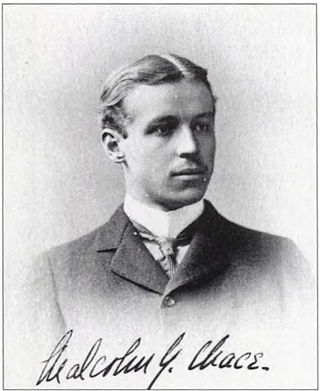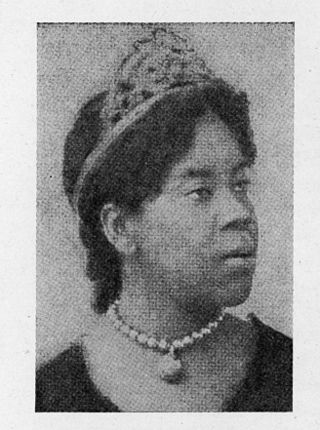
Henry Bowen Anthony was a United States newspaperman and political figure. He served as editor and was later part owner of the Providence Journal. He was the 21st Governor of Rhode Island, serving between 1849 and 1851 as a member of the Whig Party. Near the end of the 1850s, he was elected to the Senate by the Rhode Island Legislature and was re-elected 4 times. He would be twice elected to the Senate's highest post as President pro tempore during the Grant administration, and served until his death in 1884.
Rhode Island, a state of the United States, located in the New England region, is known for a diverse and thriving music scene.

The ophicleide is a family of conical-bore keyed brass instruments invented in early 19th-century France to extend the keyed bugle into the alto, bass and contrabass ranges. Of these, the bass ophicleide in C or B♭ took root over the course of the 19th century in military bands and as the bass of orchestral brass sections throughout Western Europe, replacing the serpent and its later upright derivatives. By the end of the 19th century however, it had been largely superseded by early forms of the modern tuba, developed from valved ophicleides.

Matilda Sissieretta Joyner Jones was an American soprano. She sometimes was called "The Black Patti" in reference to Italian opera singer Adelina Patti. Jones' repertoire included grand opera, light opera, and popular music. Trained at the Providence Academy of Music and the New England Conservatory of Music, Jones made her New York City debut in 1888 at Steinway Hall, and four years later she performed at the White House for President Benjamin Harrison. She sang for four consecutive presidents and the British royal family, and was met with international success. Besides the United States and the West Indies, Jones toured in South America, Australia, India, southern Africa, and Europe.

The Distin family was an ensemble of British musicians in the 19th century who performed on brass instruments, and from 1845 promoted the saxhorn. One of them, Henry Distin, later became a noted brass instrument manufacturer in the United Kingdom and United States.

Thomas Alexander Tefft was an American architect, from Providence, Rhode Island. Tefft, one of the nation's first professionally trained architects, is considered a master of Rundbogenstil and a leading American proponent of its use. Prior to his untimely death, Tefft "offered the most advanced designs of [his] day in America"

Herbert Lincoln Clarke was an American cornetist, feature soloist, bandmaster, and composer. He is considered the most prominent cornetist of his time.

Nicholas Brown Jr. was an American businessman and philanthropist from Providence, Rhode Island, and the namesake of Brown University.

Swan Point Cemetery is a historic rural cemetery located in Providence, Rhode Island, United States. Established in 1846 on a 60-acre (0.24 km2) plot of land, it has approximately 40,000 interments.

Jabez Bowen, Sr. was an American shipper, slave trader and politician. He was a militia colonel during the American Revolutionary War, and served as Deputy Governor of Rhode Island and chief justice of the Rhode Island Supreme Court.
Claudia Lennear is an American soul singer and educator. Lennear began her performing with the Superbs before becoming an Ikette in the Ike & Tina Turner Revue. She was also a background vocalist for various acts, including Joe Cocker, Leon Russell, and Freddie King. She released her only solo album in 1973. Lennear was featured in the 2013 Oscar-winning documentary 20 Feet from Stardom. She was inducted in the Rhode Island Music Hall of Fame in 2019.

College Hill is a historic neighborhood of Providence, Rhode Island, and one of six neighborhoods comprising the city's East Side. It is roughly bounded by South and North Main Street to the west, Power Street to the south, Governor Street and Arlington Avenue to the east and Olney Street to the north. The neighborhood's primary commercial area extends along Thayer Street, a strip frequented by students in the Providence area.

David Wallis Reeves, also known as D. W. Reeves or Wally Reeves, was an American composer, cornetist, and bandleader. He developed the American march style, later made famous by the likes of John Philip Sousa, and his innovations include adding a countermelody to the American march form in 1876. Sousa called Reeves "The Father of Band Music in America", and stated he wished he himself had written Reeves' "Second Regiment Connecticut National Guard March". Charles Ives also borrowed from the "Second Connecticut" on four occasions.

Malcolm Greene Chace was an American financier and textile industrialist who was instrumental in bringing electric power to New England. He was a pioneer of the sport of ice hockey in the United States, and was Yale University's first hockey captain. He was also an amateur tennis player whose highest ranking was U.S. No. 3 in 1895.

John Holden Greene (1777-1850) was a noted early nineteenth century architect practicing in Providence, Rhode Island. The bulk of his work dates to the late Federal period, and is mostly in the architectural style of the same name. Greene is responsible for the design of over fifty buildings built in the city between 1806 and 1830, almost half of which are still standing.

Alpheus C. Morse (1818-1893) was an American architect with offices in Providence, Rhode Island.

Sarah Elizabeth Doyle was an American educator and educational reformer, noted for her roles in founding the Rhode Island School of Design and establishing women's education at Brown University.

Edward "Ned" Kendall was a bandleader and musician who played the keyed bugle. He was known for his Boston Brass Band, itself a pioneer in all-brass bands, and for a trumpet-playing showdown with the former leader of the Boston Brigade Band, Patrick Gilmore. He was also known for his silver bugle, a gift from Queen Victoria.

Flora Batson (1864–1906) was a popular and well-known African-American concert singer, nicknamed "The Double-Voiced Queen of Song" because of her soprano-baritone range. She was also called "the colored Jenny Lind" in the press.




















